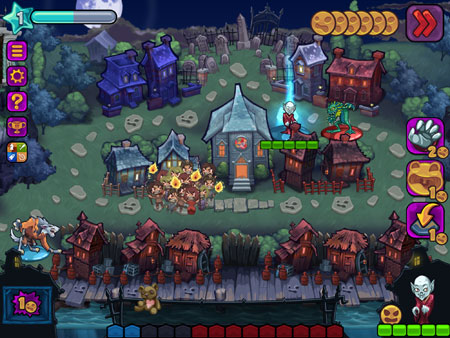Hands-on with Firaxis's Haunted Hollow for iOS
Civilization dev goes mobile (and F2P)

Firaxis is not the first company you'd associate with a colourful free-to-play iOS game. This is a firm best known for hardcore strategy epics like X-Com, and Sid Meier's Civilization games, after all.
But it's true - the company's next game is a free Halloween-themed spookfest for iPhone and iPad called Haunted Hollow.
The game is currently available in a pre-release state in Canada, which means we had an opportunity to go hands-on with the game early and show you what it's like. Read on for our full preview, or see the highlights in the video below. Or both.

Okay, so here's how Haunted Hollow works. First up, there's a big base-building element to this game. Each turn, you get to add a new room to your ever-growing haunted house, and these hastily built extensions allow you to produce units.
A belfry lets you enlist vampire recon units that can spook houses, for example, and a den gives you access to werewolves that can beat up enemy units. There are also underground labs, spooky parlours, and ancient tombs.
There's a minor puzzle element to the way you construct your house. If you slot together two or four rooms of the same type, you'll be able to enlist powerful level two and three versions of that unit.
These units are then sent down to a tiny village, which sits in the centre of the map. Your aim is to scare all 14 houses before your opponent - which has its own spooky mansion on the other side of the map - can do the same.

This leads to a scrappy back and forth, as both players contest occupation of the map. You'll need to protect monsters that can scare houses - like ghosts and swamp creatures - with monsters that can fight.
There are also neighbourhoods to take into consideration - groups of three or four nearby buildings are classed as neighbours, and if you spook the lot of them, you'll be given an extra move each turn.
And then there's the all-important angry mob. If enough houses are spooked, a herd of torch-wielding villages will group up at the church in the centre of the map, and go on a furious rampage.
They'll indiscriminately kill monsters and revert houses to neutral standing. They're a dynamic, chaotic force to be reckoned with, and unless you've got a seriously powerful unit to hand, I'd recommend you hightail it back to your mansion for a while.

So, those are the basics. It's easy to get to grips with, and might look a little shallow or lightweight from the outset. But once you start to see all the different strategies and play styles emerge, it becomes clear that this is very much a Firaxis game.
But how does the freemium stuff work? Well, don't be too alarmed - you won't be asked to pay for energy or charged by the turn.
Similar to earlier free-to-play strategy games Hero Academy and Outwitters, you buy access to new units to play with.
You might want to buy the Bogeyman, which can borrow the move-set of any unit it stands next to. Or the goblin, which can sneak into an enemy mansion and destroy rooms.
There are other things you can buy - the default Victorian house lets you bring two spooky units, two offensive units, and one special into battle. Other houses - like the mad scientist's lab or the ancient temple - have different setups.
And there are items. Three times per match, you will level-up and get access to a one-use item, like a high health boost or an attack buff. Some items need to be paid for, but you only pay once, not every time you use that item.
These things generally come in packs. A house layout, two units, and an item will cost £1.49 / $1.99. Some single units cost 69p / 99c. If you want everything, you can expect to pay about £6.50 / $8.

The question is: are the premium units significantly more powerful than the freebies, and will non-paying players be at a disadvantage?
Firaxis - a 17-year veteran of the genre - probably knows how to balance strategy games by now, but it's something we'll be keen to investigate when we review the game later this spring.
Note: this preview is based on a game in a "soft launch" state, meaning mechanics and prices may change before it's released around the world.